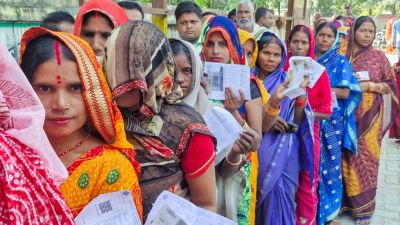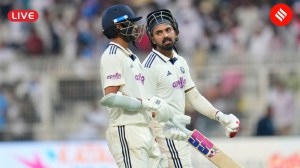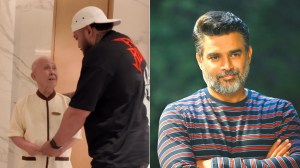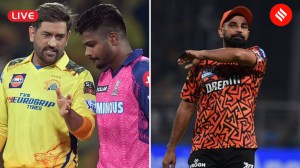Shashi Tharoor apart, how Congress failed an opportunity to address the M-question at plenary
Few Congress leaders today have the courage or conviction of the Mahatma and Nehru to stand up to the attempts to Hinduise political discourse and the Indian state
 In a speech that lasted seven minutes, Tharoor, who had contested the election for Congress president, flagged the party's muted response on the M-question. (Facebook/Shashi Tharoor)
In a speech that lasted seven minutes, Tharoor, who had contested the election for Congress president, flagged the party's muted response on the M-question. (Facebook/Shashi Tharoor) The Congress plenary in Raipur turned out to be more of a celebration of Rahul Gandhi’s Bharat Jodo Yatra. The Yatra has energised the Congress cadres, no doubt, and perhaps, given sections of the party a purpose. The plenary has promised to build on the gains made by the Yatra and prepare a roadmap for rejuvenating the Congress ahead of the 2024 elections.
Over three days, scores of leaders spoke and many resolutions were passed. It is anybody’s guess if these well-intended resolutions would excite the electorate. Or force the cadres and leaders to think deep about the party and its predicaments, among them where it stands on the M-question. The M-question could mean the ideology of (Hindu) majoritarianism that has seeped deep into society and become almost the de facto common sense. Or, it could be the position of Muslims, the country’s largest religious minority, in the wider society, and particularly, public affairs. Both issues are related. But the party did not address this question, which is perhaps the most important political question of our time, directly.
Thiruvananthapuram MP Shashi Tharoor’s intervention at the plenary becomes significant in this context. In a speech that lasted seven minutes, Tharoor, who had contested the election for Congress president, flagged the party’s muted response on the M-question.
He said: “The Congress should stand up for its foundational values. We should be absolutely clear about our ideological stances in favour of an inclusive India. The tendency to downplay some positions or avoid taking a stand on some issues in order to not alienate what we assume to be the sentiments of the majority only plays into the BJP’s hands. We must have the courage of our conviction. We could have been more vocal on the Bilkis Bano outrage, attacks on Christian churches, murder in the name of cow vigilantism, bulldozer demolitions in Muslim homes, and similar issues. These are Indian citizens who look to us for support. India is of all Indians. If we don’t speak out in such cases, we are only surrendering our core responsibility of standing up for India’s diversity and pluralism, which should be central to the Congress’s core message,” he said.
Interestingly, Tharoor’s straight talk coincided with the party facing flak for failing to include Maulana Abul Kalam Azad or any Muslim leader in a plenary advertisement. It was criticised as evidence of the Congress’s reluctance to acknowledge the contribution of Muslims to party building. Senior leader Jairam Ramesh quickly apologised and promised remedial action.
The absence of Maulana Azad, a close associate of Mahatma Gandhi, a former Congress president and the country’s first Education Minister, from posters is unlikely to be anything but an oversight. But the party should not be surprised that many felt it was a deliberate omission.
The spectre of a Hindu majority penalising the party if it spoke up for Muslims has been haunting the Congress since 2014, and has forced the leadership to remain silent about the day-to-day humiliation inflicted on the minority community in many parts of the country. In the run-up to elections, the Congress is often seen walking the extra mile to buttress its Hindu credentials. The party had surrendered itself to follow the BJP’s playbook, which is unabashed in projecting itself as a party of Hindus and Hindu interests. Prime Minister Narendra Modi himself has taken the lead by presiding over temple building and renovation and attending rituals. These are choreographed to be public spectacles with overt religious dimensions. The BJP has also been framing the Congress as a party inimical to Hindu interests.
The Congress seems to believe that the electorate has rejected it, as it has bought into the BJP propaganda. So party leaders go temple hopping during elections, in a bid to tell voters that they are no less Hindus than those from the BJP. In a bid to appease the “Hindu sentiment”, the party has embarked on a path that has taken it further away from the foundational values that Tharoor spoke about. The tactical silence on Hindu communalism is punctured occasionally by Rahul Gandhi, who has blamed the Sangh Parivar for fostering a politics of hate. But is Rahul Gandhi’s ideological clarity shared by the party at the grassroots? Why do many Congress leaders fail to challenge the Sangh Parivar’s weaponisation of what it deems as Hinduism?
Popular Hinduism is a public religion. Congress politicians have always engaged with it in the social space without necessarily making a show of it. Mahatma Gandhi spoke about truth as religion and Lord Ram as his ideal, and adopted ahimsa as his credo. For him, politics and religion were ethical urges; he saw them as a part of the same continuum. However, faith was a private matter for Gandhi and he refused to endorse ritualistic or temple-centric religion. Jawaharlal Nehru recognised the cultural impulses in religion but refused to mix faith and statecraft.
Gandhi and Nehru, however, were against attempts to define India as a Hindu rashtra. Both emphasised Hindu-Muslim unity and opposed majoritarianism. Within this broad framework, the Congress negotiated the demands of civic religion and left it to the judiciary to codify customs and traditions. The latter, of course, was more than happy to adjudicate. The political scenario changed in the 1980s with the strengthening of the religious right, not just in India but also its extended neighbourhood.
Old arguments about secularism seem incapable of taking on parties that have no qualms in politicising and weaponising faith. Few Congress leaders today have the courage or conviction of the Mahatma and Nehru to stand up to the attempts to Hinduise political discourse and the Indian state. They may parrot that diversity and pluralism are cornerstones of the republic, but are hesitant to challenge majoritarianism upfront. They fear being branded anti-Hindu if vulgar, or criminal, acts carried out in the name of Hinduism are called out. They prefer to seek success by embracing tactical silences rather than risk defeat by standing up for one’s convictions. If this diffidence continues, it may negate whatever gains the party has made with the Bharat Jodo Yatra.
Tharoor’s shout-out is to the Congress leader who is at ease with Nehru’s secular statecraft and the religiosity of the citizens. Tharoor himself may claim to be one such leader – his work on Nehru and Hinduism is evidence. There is also a local, Kerala context, where he is seen by many as a potential chief ministerial candidate of the Congress. The influential Muslim League has backed Tharoor’s ascent, to the discomfort of the many suitors for office in the Congress. Tharoor’s demand for a Congress that is unapologetically and aggressively secular may have resonance in his home state, in the Congress-led United Democratic Front.


- 01
- 02
- 03
- 04
- 05




























